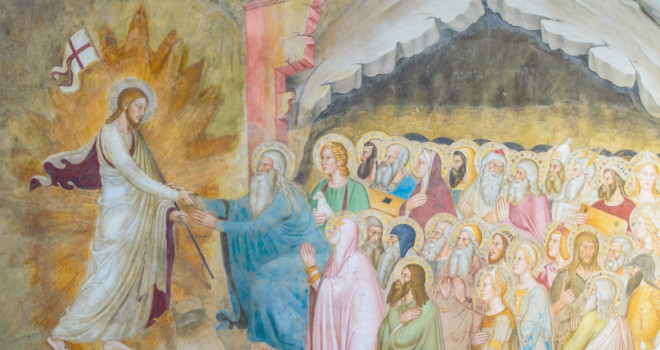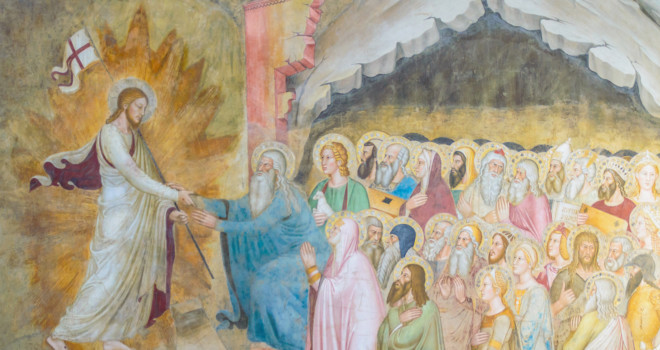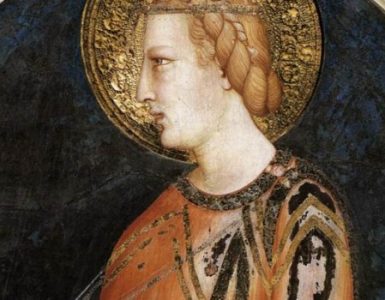There were no Easter egg hunts on the first Easter Sunday. There was no Easter bunny. There was no ham dinner, or a joyful family get-together.
There was silence. There was grief. There was emptiness. And then…there was hope breaking through.
In my own life, I am currently dealing with some grief related to a family member who is no longer in my life. I have other close friends who are also dealing with significant griefs right now. When the liturgical calendar flipped from Lent to Triduum to Easter, our suffering and grief didn’t go away. Are any of us “failing at Easter”?
Suffering during Lent vs. Easter
I can remember years when I was pregnant and suffering from hyperemesis gravidarum during Lent. Bedridden, dehydrated, nauseous, hungry, lonely…in those years, this penitential season was easy. During Lent, I felt like I was not suffering alone. The whole Church was suffering, too.
But then, inevitably, Easter Sunday would roll around. The rest of the Church ceased fasting, ceased outward shows of suffering, and I felt left behind. I felt alone again.
This experience of mine is not unusual. Rarely, do our personal circumstances sync perfectly with the liturgical year. Rarely does our experience of suffering cease with Easter. Yet, anyone who suffers might hold a private hope that maybe the suffering will miraculously dissipate with the first strains of the Alleluia. During my first pregnancy, unaware that what I was experiencing was hyperemesis gravidarum (and that I would continue to be very sick for another six months), the end of my first trimester coincided with the beginning of Easter. I was convinced that my “morning sickness” would miraculously lift on Easter Sunday. It did not.
Was I failing at Easter that year? Am I failing at Easter this year, as I deal with grief and suffering of a different kind?
To answer this, we have to look back to the Scriptures. What was the first Easter like?
Easter in the Gospels
There is a tinge of sorrow, confusion, and lingering grief in all the Gospel accounts of Easter. You do not immediately shift from seeing your best friend or son violently, publicly killed to laughing and delight when you realize he is alive again. The wonder, awe, and joy that the followers of Jesus must have experienced when they saw him again would have been shaped and formed by the experience of suffering. Joy that is formed by suffering is deeper and truer than joy that has never stood at the foot of the cross.
When Mary Magdalene went to the tomb, she was distraught. She must have been crying in that intense way that blurs your vision and makes it hard to walk or talk. She encountered an angel—an angel!—and it did not even register. Then, she encounters Jesus himself, and she is still lost in her tears and grief. It is not until he calls her name that she looks up and realizes what has happened. She begins to cling to him, but then he gives her a mission—to go and tell the others that he has risen.
This woman, who only moments before was sobbing, now takes off running and free.
On the road to Emmaus, two disciples encounter Jesus. They are busy processing. Men grieve differently than women, trying to make sense of the tragedy that has happened. Surely, there must be a reasonable way to understand it all? (Whenever my spiritual director, a priest, tries to logically piece out something that I am emotionally working through, I teasingly tell him that his explanation was given in a very “man brain” way.) When Jesus walks with them, they do not initially recognize him. Mary was lost in the emotional experience of grief. They are lost in the rumination stage, trying to find an explanation for the unexplainable. In Mary’s case, Jesus breaks through her tears with words and a mission. In the case of the disciples on the way to Emmaus, he breaks through their words and search for a mission with strong emotion. After he leaves them, they turn to each other and ask, “Were not our hearts burning within us?”
In their grief, in their own propensities for dealing with their pain and confusion, Jesus knew just how to break through their defenses. He knew just how to pierce their darkness with his light.
But it is not really until Pentecost that we see a shift in the Apostles. Until then, they are still often afraid, sad, confused. It is not until they are infused with the Holy Spirit that they are able to run towards suffering, knowing that they are running into the arms of their beloved Jesus.
What does this mean for those of us who are grieving or suffering this Easter?
Hope—Greater than Happiness
Surely, the Apostles and followers of Jesus were happy that he was no longer dead. But still, things were not the same. Yes, he was alive. No, he was not alive in the same way. He was not sleeping beside them, eating with them, traveling along with them. There was still a change, a shift, and something to grieve (at least initially).
The resurrection gave a greater gift than mere happiness (which cannot really endure in this life, anyway). The resurrection gave them the gift of hope.
Their suffering was not removed. They still felt a tinge of grief at the loss of their friend—even if that loss was because he was going to his Father to prepare a place for them. But now, permeating their suffering and grief was something more powerful than fleeting happiness—there was hope.
And so it is with those of us suffering this Easter. If we are not walking around with happiness coursing through our veins, that is ok. The happiness will come—if not in this life, then surely in the next. But, in the meantime, Easter gives us the gift of hope. The cross is no longer a sign of failure. It has been transformed into a sign of victory. Our suffering, our grief, is no longer a sign that we are failing. Instead, the cross has transformed it into a means of greater union with our Beloved, who suffered on the cross. Those who have shared so closely in his suffering will surely share closely in his victory. Because of the resurrection, those who weep can now have hope that they will one day laugh.
And that joy—the joy that comes after bearing the cross with love and fidelity, looking to Jesus and longing for greater union with him—is a joy that no one can ever take away. Easter is for those who are suffering, for those who are grieving—because it is only through the experience of the cross that we can fully appreciate the reality of Easter.
✠
image: Resurrection of Jesus – a detail of a historic renaissance fresco wall painting of Jesus descending to hell and liberating the righteous men, photo by Thoom / Shutterstock.com












